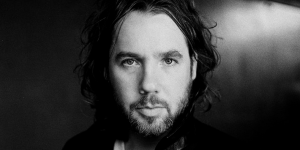 Music
Music
The Hold Steady's Craig Finn navigates through anxious times
by Ryan McNutt
April 17, 2014
The Hold Steady have always been a Rock band with a capital “R,” so it’s not surprising they would mark their tenth anniversary earlier this year with a set of career-spanning retrospective shows—or that, when asked about the occasion, vocalist and lyricist Craig Finn would refer back to the bands he grew up with.
“There’s a sense of accomplishment, and also of just surviving, in that most of my favourite bands didn’t have six records, don’t have a 10-year career,” says Finn, speaking by phone from his home in Brooklyn.
“It’s hard to keep a band together over that long a period of time. No one’s making that much money and it can be a tough lifestyle, although I think it speaks to how much we enjoy doing it. I still really love the travel, I love the shows, I love the soundcheck, so in some ways, it wasn’t that hard at all. I just think it’s great we had a committed bunch of people that have stuck with it over 10 years and the community around the band is a huge part of it.”
Though the Hold Steady often get tagged with the “bar band” label—not entirely unfairly—they approach their classic rock flourishes with a punk ethos and a striking success rate at winning over status-seeking indie rockers. In this regard, they’re not dissimilar to one of their key influences, fellow Minnesotans the Replacements (who, like Finn and his previous band, art punks Lifter Puller, also came out of Minnesota). The difference, though, is that there’s no fleeting taste of irony, no lingering tongue-in-cheek: the Hold Steady’s infectious enthusiasm for all ends of the white, masculine rock spectrum they inhabit is entirely genuine, welcoming, and a big reason for their success over the past decade.
Teeth Dreams, the Hold Steady’s sixth album, is an energetic reminder of just why the band can claim such a devoted following—and why they’re decidedly more than just a rock museum piece. Arriving after a four-year wait—the longest break in the band’s history—Teeth Dreams crackles from the first chord, with former Tad Kubler’s infectious guitar hooks giving the record its driving momentum.
But at the band’s centre is Finn, one of the best songwriters of his generation when it comes to crashing boys and girls into one another. He writes romance as a chemical reaction with Catholic overtones: a holy quest for salvation in the kisses and bedrooms of others, with cheap booze and chemicals serving as helpful (sometimes harmful) catalysts. With literary savvy—his favourite song on the record, “On With the Business,” was inspired by David Foster Wallace—Finn’s taste for detail makes you an insider in his character’s scenes. You can almost see the haloed smoke rings, smell the stale beer, and hear the chapel bells blurring into the guitar chords.
“I grew up Catholic and I still go to church, and it’s on my mind a lot,” says Finn, when asked about the religious imagery that’s become a Hold Steady trademark. “It’s always something heavy, especially if you come from that background, whatever guilt or things are wrapped up in your own personal feelings on that.
“But I think there’s also the thing about Christ suffering that I keep coming back to and thinking about. Our lives are a struggle; that’s the Catholic metaphor of carrying the cross, and it’s often apropos.”
One of the most common crosses Teeth Dreams bears is a heightened sense of fear and anxiety. Finn’s characters have been on edge—a sentiment enhanced by his nervy, neurotic vocal style—but they’ve pushed through in a haze of alcohol, drugs, and romance. Here, that subtext becomes text, and on tracks like “I Hope This Whole Thing Didn’t Frighten You” and “The Only Thing,” the worries seem to win out more often than not.
“At the beginning of the record cycle I met this doctor who was telling me that more than half of the people who come into his office, as a general practitioner in New York, come in for anxiety, and a lot of times they think there’s something wrong with them that isn’t,” says Finn.
Finn’s anecdote is backed up by the numbers: approximately 40 million American adults are affected by anxiety disorders in a given year, according to the National Institute of Mental Health. Surveys have also shown that young adults—the very sort Finn tends to write about—feel more stressed and anxious than the population at large.
“So do we live in particularly anxious times?” asks Finn. “It was just tapping into that idea of being really anxious. In some ways, it’s a dark record, it’s a dark title and these people are kind of being brought down by it. But I also wanted to connect them: we all have our own anxieties and, in some ways, that’s a unification, a way in which we all connect.”
Joining that anxiety at the forefront of Teeth Dreams are guitars, and lots of them. The Hold Steady’s breakthrough records—2005’s Separation Sunday and, particularly, 2007’s Boys and Girls in America—were distinctly marked by Franz Nicolay’s rollicking piano playing. Nicolay left the band just prior to 2010’s Heaven is Whenever, and the resulting album sounded like the band struggling to come up with a sound equally as compelling. Teeth Dreams’ amiable solution to this is to simply go all-in on guitars, aided by the addition of second axeman Steve Selvidge. Even the slower songs, like mid-album ballad “The Ambassador,” hit decidedly harder.
And yet, as the sound of the band evolves, the template for what makes a Hold Steady song—boys and girls in America—remains intact, even though the architect of their stories is now in his early 40s.
“Writing about a 19-year-old when you’re 40, you can feel around the things that are funny about being 19 that don’t seem funny when you’re 19; they seem kind of terrifying [at the time],” says Finn. “So I think there’s a detachment that allows you to look back and tell good stories. I always love characters that are that 19 to 22 because they have enough freedom to make big mistakes, but there’s a lot of confidence too. So it’s like a perfect storm of bad decisions.”
Finn describes his writing for the Hold Steady as “cinematic,” inspired by the band’s big rock sound—a sound he intentionally moved away from on his softer solo record, 2012’s Clear Heart, Full Eyes.
“I always say that on the solo record, no one gets shot and falls off the roof, whereas in a Hold Steady song they might,” he says, with a laugh. “You kind of make things bigger, and the Hold Steady stuff ends up being much bigger in scope.”
And how much longer does he think he can keep writing those sorts of widescreen anthems, playing the big rock game?
“It’s not lost on me that most bands that stick around for 20 years are pretty successful, on a level of, say, The Stones—it’s easy for them to play 30, 40 years because they show up in their own airplanes or whatever. It gets harder, quite honestly: touring is a little harder on me at 42 than it was at 32. But there’s still a lot of reward out there, so I don’t see any end in the near future.”

This article originally appeared in the April 2014 Issue of AUX Magazine.
Download and subscribe for free in the app store.





